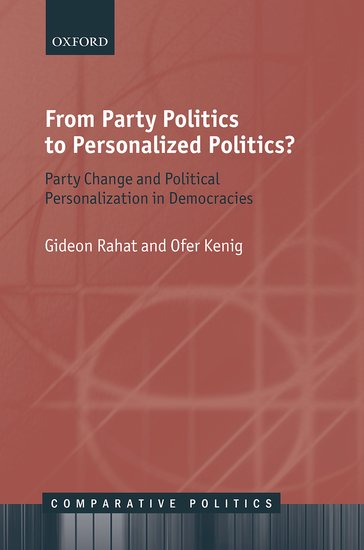Install the app
Install this application on your home screen for quick and easy access when you’re on the go.
Just tap then “Add to Home Screen”
Install this application on your home screen for quick and easy access when you’re on the go.
Just tap then “Add to Home Screen”
Install this application on your home screen for quick and easy access when you’re on the go.
Just tap then “Add to Home Screen”
 New from the OUP / ECPR Comparative Politics series is From Party Politics to Personalized Politics? Party Change and Political Personalization in Democracies
New from the OUP / ECPR Comparative Politics series is From Party Politics to Personalized Politics? Party Change and Political Personalization in Democracies
The book examines two of the most prominent developments in contemporary democratic politics, party change and political personalisation, and the relationship between them. It presents a broad-brush cross-national comparison of these phenomena, spanning around 50 years in 26 countries, through the use of more than 20 indicators.
Authors Gideon Rahat and Ofer Kenig demonstrate that despite a shared general trend of decline of political parties, there is much variance among countries regarding the extent of the decline. In some, party decline is moderate or even low; this may point to their adaptation to the changing environments in which they operate. In other countries, parties decline sharply. Most cases fall between these two poles.
The personalisation of politics is also identified in all countries reviewed, though here too there are large differences among countries regarding its magnitude. Surprisingly, the online world seems to supply parties with an opportunity to revive.
A moderate linkage is found between the two phenomena: when parties decline, personalisation increases. Yet these are far from being perfect zero-sum relationships, which leaves room for the possibility that other political actors may step in when parties decline and that, in some cases, personalisation may not hurt parties and may even strengthen them.
Personalisation represents a huge challenge to parties. But parties were, are and will remain a solution to the problem of collective action, of channelling personal energies to the benefit of the group. Thus, they can cope with personalisation and even use it to their advantage.
Speaking to the ECPR about the book, Gideon told us:
'I see this study as an expression of the many insights that we accumulated during our years of collaboration on many international research projects that examined political parties, including leadership and candidate selection, party membership and parties-unions relationships. We tried to figure out what links all these various projects and came up with this comprehensive cross-national comparison.'
'We took a rather unique methodological path. We recognized the limits of the data that we gathered, yet we were determined to not to give up on our attempt to map cross-national variance concerning the long-term processes of party change and political personalisation. We are ready and willing to hear criticism of this project from researchers and scholars, but we hope that they will take that criticism a step further and propose improvements to our approach rather than just leave it as it is.'
Speaking to the ECPR about the book, Ofer told us:
'This book is the result of an intense four-year-long effort. What strikes me now is that when we started the project, political figures such as Donald Trump and Emmanuel Macron weren't "there" yet. Also, in the course of these years, the crisis of the established mainstream parties in Western Europe seems to have become even more prominent. I think that this reaffirmed for both of us the relevance of the issue. We really hope that the book will provide a solid basis for future investigations.'
 About Gideon
About Gideon'I am a professor in the Department of Political Science at the Hebrew University of Jerusalem and a senior fellow at the Israel Democracy Institute. My broad research fields are Israeli politics and comparative politics, and within them I focus mainly on the politics of electoral reform, political parties (especially candidate and leadership selection), and political personalization. One issue that has been keeping me busy of late, in the face of the populist challenges to democracy, is how personalization can be used to somehow strengthen party democracy, rather than promoting its demise and its exposure to populist personalized trends.'
 About Ofer
About Ofer'I am a senior lecturer at Ashkelon Academic College and also a research fellow at the Israel Democracy Institute. My areas of research include comparative politics, political parties, leadership and candidate selection and Israeli politics.'
Keywords: Democracy, Political Parties